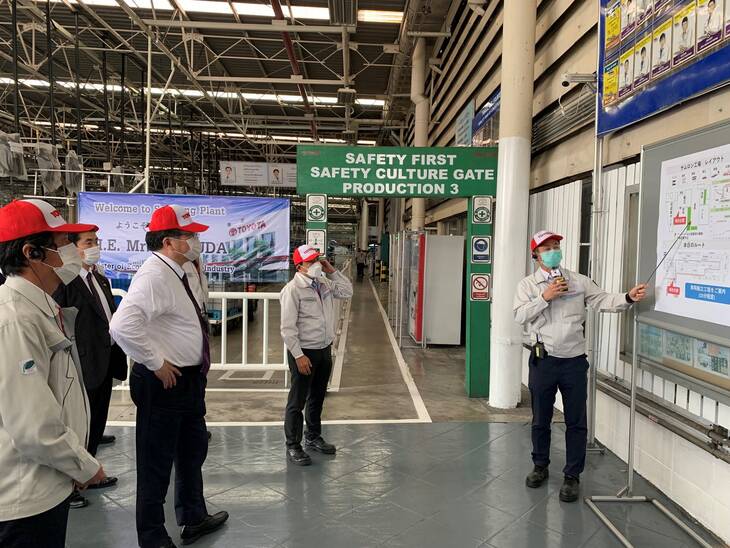January 14, 2022
From January 9 (Sun.) to January 14 (Fri.), Minister Hagiuda visited Indonesia, Singapore, and Thailand to hold bilateral meetings, etc. with relevant ministers and others. In addition to using this opportunity to exchange views with local businesses and others, Minister Hagiuda also announced the ASIA-Japan Investing for the Future Initiative while on the trip. With this, the minister aims to deepen economic relations with ASEAN countries toward Asia-Japan cooperation after COVID-19.
Announcing the ASIA-Japan Investing for the Future Initiative
Minister Hagiuda participated in an online event co-hosted by Indonesia’s FPCI think tank and others. There, they announced the ASIA-Japan Investing for the Future Initiative, a new initiative pointing the way toward post-COVID-19 Asia, in which Japan will work together with other Asian countries to actively promote new, future-oriented investments.
Bilateral meetings, etc. in Indonesia
During the Indonesia leg of his trip, the minister held talks with Mr. Arifin (Minister of Energy and Mineral Resources), Mr. Lutfi (Minister of Trade), Mr. Agus (Minister of Industry), Mr. Luhut (Coordinating Minister for Maritime Affairs and Investment), and Mr. Airlangga (Coordinating Minister of Economic Affairs). They discussed a wide range of issues, including energy transitions and efforts toward deepening bilateral economic relations based on the concepts behind the ASIA-Japan Investing for the Future Initiative. He also had a meeting with Mr. Lim, Secretary-General of ASEAN, and they exchanged views on RCEP, economic cooperation between ASEAN and Japan, and more.
(1) Meeting with Mr. Arifin, Minister of Energy and Mineral Resources
Given the circumstance of decarbonization in Indonesia and in order to move forward with various and realistic energy transitions that utilize the widest variety of energy sources and technologies, Minister Hagiuda and Minister Arifin both signed a Memorandum of Cooperation on the Realization of Energy Transitions toward decarbonization, and both countries confirmed that they will work together under the Asia Energy Transition Initiative (AETI). In addition, the two ministers agreed to further deepen their cooperation in the energy field, including at the G20 (which Indonesia will chair this year). In response to the temporary coal export ban, Minister Hagiuda called for early normalization of export, and Indonesia’s government announced that it plans to relax the measure.
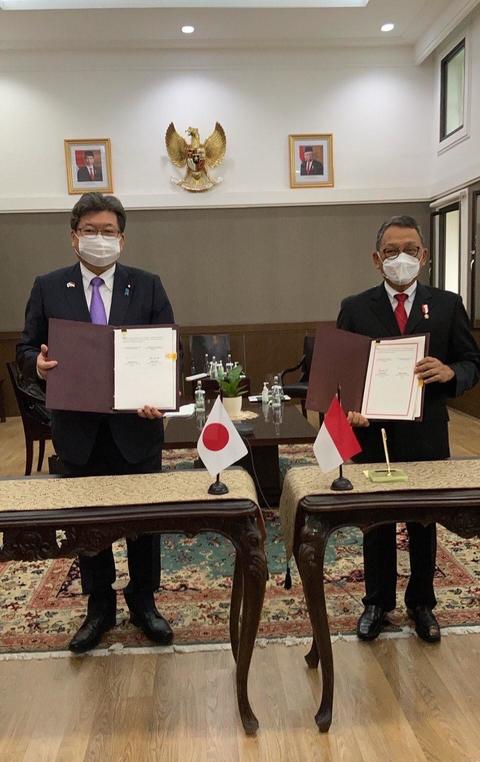
(2) Meeting with Mr. Lutfi, Minister of Trade
Meeting with Minister Lutfi, Minister Hagiuda explained Japan’s efforts to strengthen bilateral economic relations between Japan and Indonesia in line with the ASIA-Japan Investing for the Future Initiative. Additionally, the ministers exchanged views on the development of the business environment in Indonesia; trade policies, such as the G20, the Japan- Indonesia EPA, and the RCEP; and a wide range of individual industrial policies.
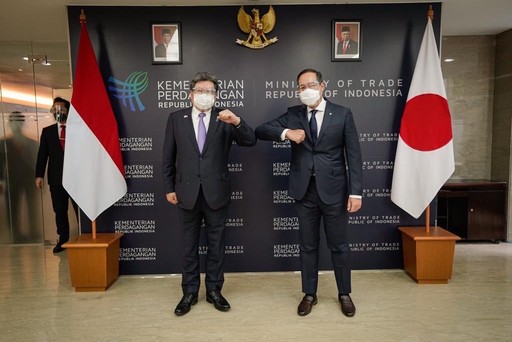
(3) Meeting with Mr. Agus, Minister of Industry
In addition to explaining Japan’s efforts to strengthen bilateral economic relations between Japan and Indonesia in line with the ASIA-Japan Investing for the Future Initiative, Minister Hagiuda and Minister Agus exchanged views on subjects like cooperation on supporting industries in Indonesia (including human resource development) and a wide range of individual industrial policies, etc. including the automotive industry and others.
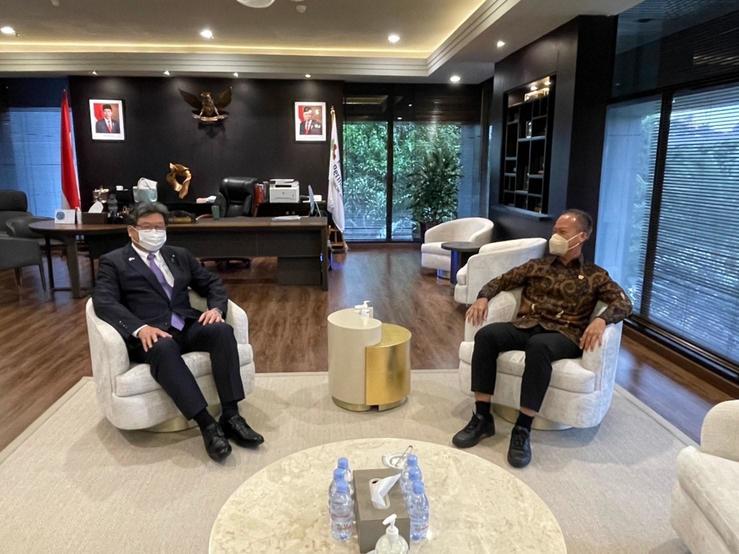
(4) Meeting with Mr. Lim, Secretary-General of ASEAN
Minister Hagiuda explained that Japan will actively make new, future-oriented investments in the supply chain, connectivity, digital innovation, and human resources fields, in line with the ASIA-Japan Investing for the Future Initiative. The two leaders exchanged views on deepening relations between Japan and ASEAN countries.
They also confirmed that Japan and the ASEAN Secretariat will work closely together to ensure full implementation of the RCEP Agreement, which came into force on January 1, 2022.
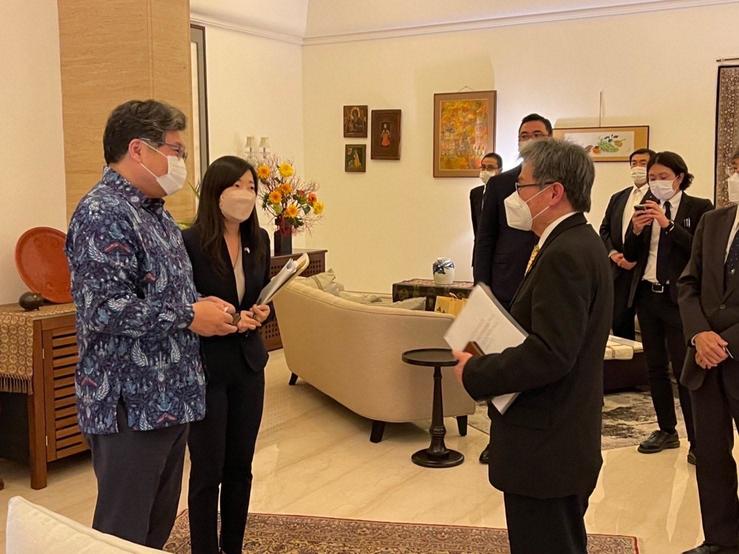
(5) Meeting with Mr. Luhut, Coordinating Minister for Maritime Affairs and Investment
In addition to explaining Japan’s efforts to strengthen bilateral economic relations between Japan and Indonesia based on the ASIA-Japan Investing for the Future Initiative, Minister Hagiuda and Minister Luhut exchanged views on subjects—including individual industrial policies—from a wide range of perspectives, such as improving the business environment in Indonesia and cooperation in the energy sector under the AETI.
In response to the temporary coal export ban, Minister Hagiuda called for early normalization of export, and Indonesia’s government announced that it plans to relax the measure.
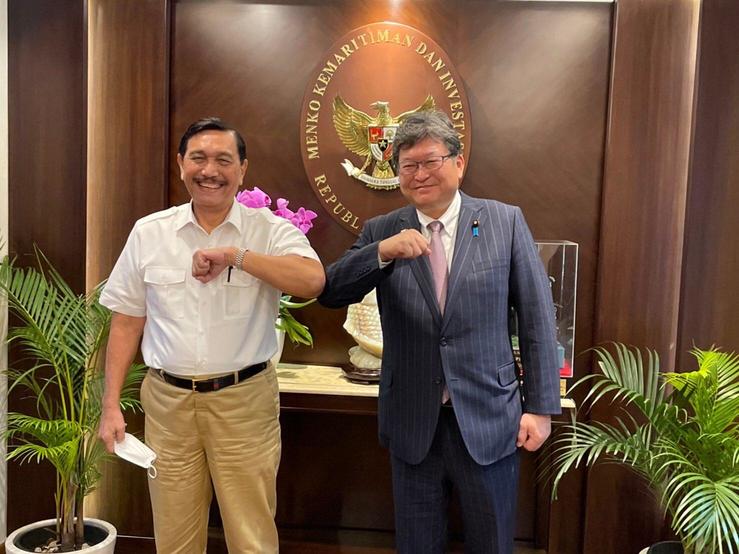
(6) Mr. Airlangga, Coordinating Minister of Economic Affairs
Indonesia is the G20 chair in 2022, and Minister Airlangga is the minister in charge. Minister Hagiuda expressed to him Japan’s willingness to cooperate fully in making the G20 a success, and the two leaders exchanged views toward the G20’s trade, digital, and energy and climate change meetings.
In addition, in order to strengthen the bilateral economic relationship between Japan and Indonesia, Minister Hagiuda explained Japan’s efforts in line with the ASIA-Japan Investing for the Future Initiative, and the leaders established the Japan Indonesia Co-Creation Partnership for Innovative and Sustainable Economic Society. This is intended to make efforts based on the initiative more realistic in line with the actual state of Indonesia through establishing public-private dialogue.
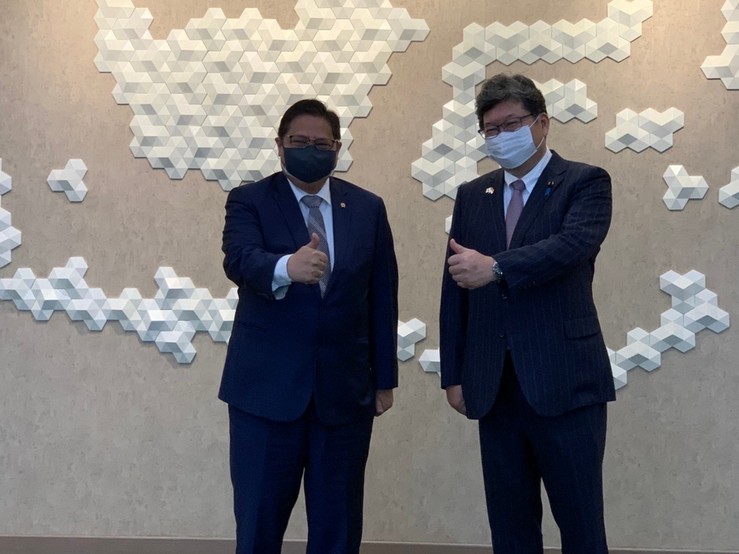
Bilateral meetings, etc. in Singapore
During the Singapore leg of his trip, Minister Hagiuda met with Singapore’s Minister of Trade and Industry, Mr. Gan Kim Yong, to discuss a wide range of subjects including bilateral relations, RCEP, CPTPP, and so on. He also visited a shared office space to exchange views with Japanese companies involved in venture capital and startups, etc.
(1) Meeting with Mr. Gan Kim Yong, Minister of Trade and Industry
Meeting with Minister Gan Kim Yong, Minister Hagiuda explained Japan’s efforts to strengthen bilateral economic relations between Japan and Singapore in line with the ASIA-Japan Investing for the Future Initiative. The two exchanged views on a wide range of fields, including bilateral cooperation in the trade and energy sectors, and issued a joint statement pointing the way toward further collaboration.
Given the circumstance of decarbonization in Singapore and with the aim of accelerating energy transitions in Asia, both ministers signed a Memorandum of Cooperation on Low-Emissions Solutions, which includes an approach to transition finance. The two countries also agreed to work together under the AETI.
(2) Exchanging opinions with startups, etc.
Minister Hagiuda visited One&Co—a shared office becoming a hub for Japanese companies creating innovation in Southeast Asia—and learned about each company’s efforts.
While exchanging views with Japanese companies involved in venture capital, startups, etc., they actively discussed the Southeast Asian market’s potential for further growth, the importance of acquiring and utilizing local human resources, and the need for Japanese companies to transform their organizational structures to create innovation.
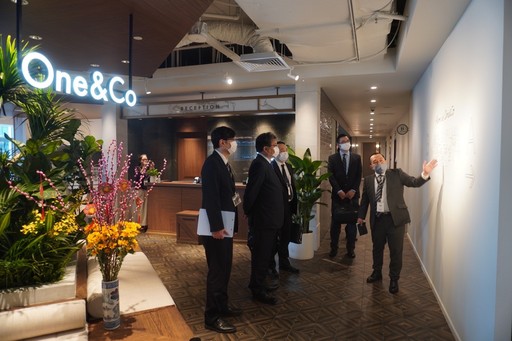
Bilateral meetings, etc. in Thailand
During the Thailand leg of his trip, Minister Hagiuda paid a courtesy visit to Mr. Prayut (Prime Minister of Thailand) and held meetings with Mr. Supattanapong (Deputy Prime Minister and Minister of Energy), Mr. Don (Deputy Prime Minister and Minister of Foreign Affairs), Mr. Anek (Minister of Higher Education, Science, Research and Innovation), and Mr. Suriya (Minister of Industry). They discussed a wide range of issues, including bilateral relations, the ASIA-Japan Investing for the Future Initiative, and energy transitions. He also visited a local Toyota plant.
(1) Courtesy visit to Prime Minister Prayut
Prime Minister Prayut and Minister Hagiuda confirmed the two countries’ firm, positive bilateral relations—which have lasted for many years—on trade, investment, human resource exchange, and more. Minister Hagiuda explained that Japan will actively make new future-oriented investments in line with the ASIA-Japan Investing for the Future Initiative, and the two leaders discussed how Japan’s Green Growth Strategy will work with Thailand’s Bio-Circular-Green (BCG) Economy Model, as well as their cooperation in the energy and industry sectors.
In the presence of Prime Minister Prayut, Minister Hagiuda and Mr. Supattanapong (Deputy Prime Minister and Minister of Energy) signed the Memorandum of Cooperation on the Realization of Energy Partnership between the Ministry of Economy, Trade and Industry of Japan and The Ministry of Energy of the Kingdom of Thailand to accelerate various and realistic energy transitions under the AETI in order to achieve sustainable growth and reduce greenhouse gas emissions.
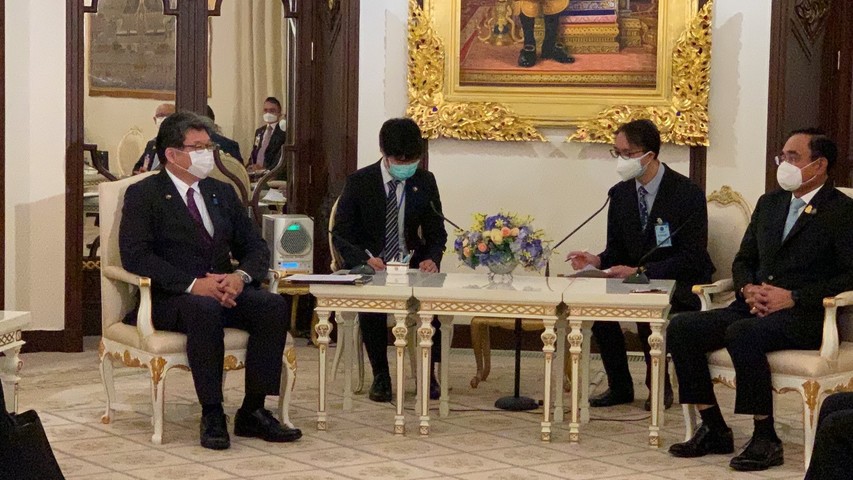
(2) Meeting with Mr. Supattanapong, Deputy Prime Minister and Minister of Energy
Meeting, Minister Hagiuda expressed Japan’s intention to propel new, future-oriented investments—based on the concepts behind the ASIA-Japan Investing for the Future Initiative—in order to deepen the bilateral relations between Japan and Thailand that have been cultivated over many years. The two exchanged views on various issues related to deepening Japan and Thailand’s economic relations, including various and realistic energy transitions that utilizes the widest variety of energy sources and technologies under the AETI, as well as promoting innovation, strengthening competitiveness, and securing stable economic growth.
As a result of the meeting, the two ministers issued a joint press statement titled The Meeting between Economic Ministers of Thailand and Japan, on Initiative for the Co-creation Partnership towards Future Investment. They also attended the signing of a memorandum of cooperation between JETRO and the Board of Investment of Thailand and the Eastern Economic Corridor (EEC) Secretariat.
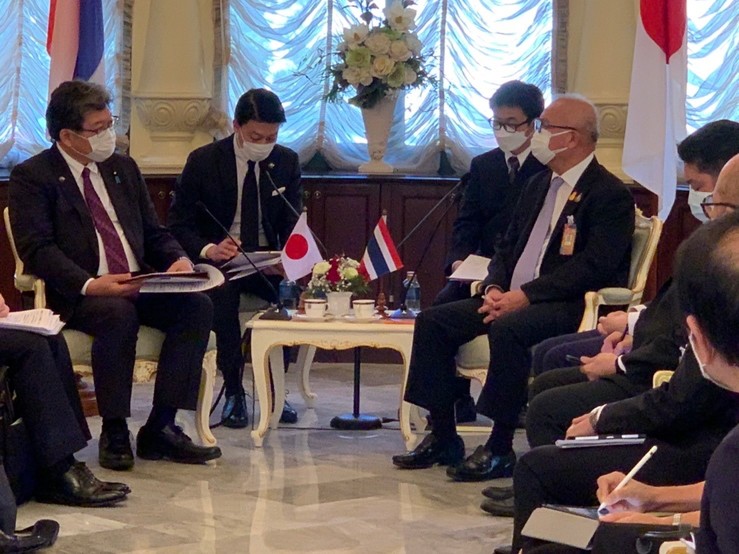
(3) Meeting with Mr. Don, Deputy Prime Minister and Minister of Foreign Affairs
Thailand is the 2022 APEC chair, and Minister Hagiuda conveyed to Minister Don Japan’s intention to cooperate with Thailand in line with their theme of “Open, Connected, and Balanced.” He also expressed Japan’s intention to support the BCG Economy Model, which aims for growth mainly within the APEC priority issues set by Thailand. These include (1) meetings on new trade issues, such as responses to social issues; and (2) responses to things like Bio (of BCG), circular economy, and environmental issues. The leaders also exchanged views on trade policies, including cooperation toward full implementation of the RCEP Agreement.
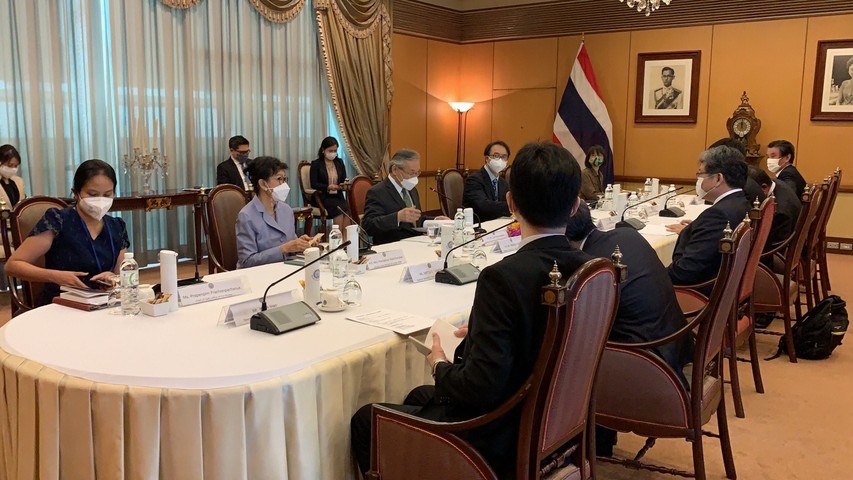
(4) Meeting with Mr. Anek, Minister of Higher Education, Science, Research and Innovation
Minister Hagiuda explained to Minister Anek (who is responsible for incubating innovation) that Japan will actively promote new, future-oriented investments in line with the ASIA-Japan Investing for the Future Initiative and promote co-creation, or innovation together with creation, with ASEAN companies and others. The leaders also exchanged views on how Japan’s Green Growth Strategy aligns with the BCG (Bio-Circular-Green) Economy Model green growth strategy that Minister Anek is taking initiative on.
In addition, the two ministers exchanged documents on the framework for further cooperation.
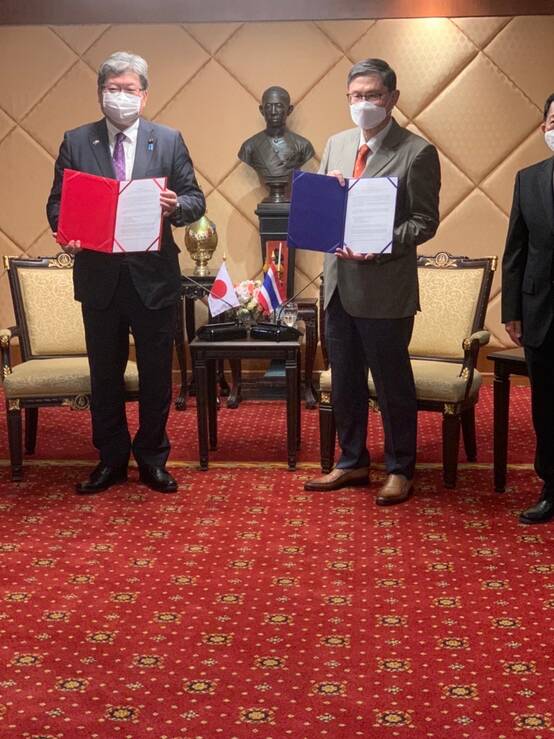
(5) Mr. Suriya, Minister of Industry
Minister Hagiuda confirmed with Minister Suriya that Japan and Thailand are important partners as they share many supply chains. Then, the two exchanged views on continuing efforts to cooperate in human resource development, strengthen supply chains, etc.
The two ministers also exchanged framework documents on cooperation, and JETRO Bangkok and the Thailand Automotive Institute signed an update to their Letter of Intent in front of the two ministers.
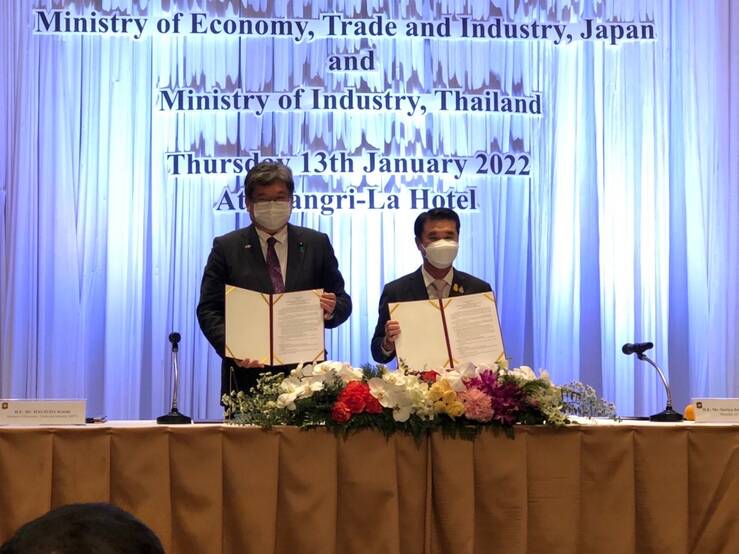
(6) Visit to a Toyota plant
Minister Hagiuda visited Toyota’s Samrong plant, near Bangkok. While touring the production site at the company’s automobile plant (operating in Thailand since the 1960s), the minister exchanged views with factory workers about the automobile industry’s current state and issues, including the importance of the supply chain and the response to the Thai government’s new policies aimed at achieving carbon neutrality.
